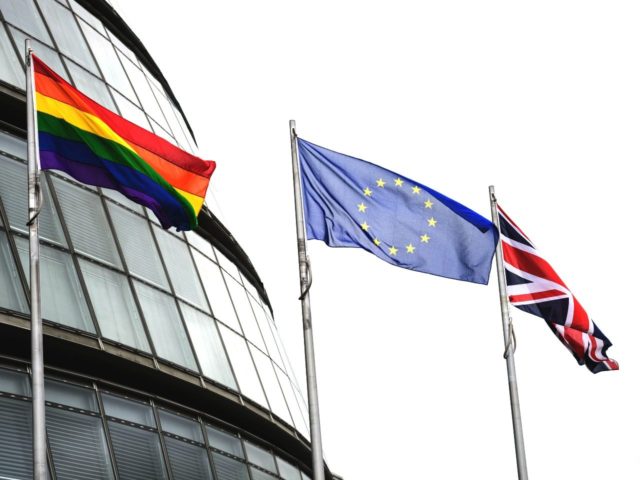The Brexit campaign has caused a surge in British people verbally and physically attacking lesbian, gay, bisexual, and transgendered (LGBT) people, left-wing groups have claimed.
According to the LGBT anti-violence charity Galop, attacks on LGBT people shot up by 147 per cent in the three months before the vote, with The Guardian attributing the stats to “toxicity fostered by the EU referendum debate spreading beyond race and religion”.
Critics have pointed out that the rise is instead down to people being encouraged to report more “offensive” thing, and may not reflect an actual rise in attacks. However, according to Galop’s new report, an astonishing 4 out of 5 – or 80 per cent – of LGBT people in the UK now experience ‘hate crimes’.
If taken at face value, the alleged rise in hate crimes suffered by LGBT people would be even more dramatic than other alleged rises faced by religious and ethnic minorities in the wake of Brexit.
Read about the spike Galop saw after referendum vote – https://t.co/liQJW6HFWu
— Galop (@GalopUK) October 9, 2016
The report reveals, however, that many of the ‘crimes’ recorded by Galop were not reported to the police because people were “unsure if it was a crime”.
As defined by British law, so-called hate crimes are subjective in nature. UK police log “any criminal offence which is perceived, by the victim or any other person” and the vast majority are recorded online, with no evidence, and are merely “offensive” comments.
Accordingly, Galop’s report concedes that only “roughly 1 per cent of sexual orientation hate crimes committed go on to be proven as hate crimes by a court”.
However, the report argues that this not evidence of over-reporting of mean comments, but a reason for harsher sentencing.
“The highest prison sentence a court can give for homophobic, transphobic or disability common assault is six months. That is just a quarter of the two-year maximum for race and faith common assault. This disparity needs redress,” Nik Noone, Galop’s chief executive, told The Guardian.
David Isaac, chair of the Equality and Human Rights Commission, said: “Currently, the law and sentencing policy create a ‘hierarchy of hate crime’ and send the message that some groups are more worthy of protection than others.”
The report does not directly link the alleged rise in anti-LGBT attacks to Brexit, but The Guardian appears to do so by comparing it to the so-called Brexit hate crime ‘epidemic’ which has already been debunked as a politically-motivated myth.
The claim is based on one line from a single press release issued by the National Police Chief’s Council (NPCC) on June 27th. In the four days immediately after the vote, online reports had “risen 57 per cent” — to a grand total of 85 complaints.
At the time, pro-EU campaigners were mobilising tens of thousands of people on social media to report stories and “perceived” slights that they could forward to the press and blame on Brexit.
This was acknowledged by police. The same NPCC document also said forces recorded “no major spikes in tensions” after the vote. In fact, prosecutions for hate crimes have actually fallen since June.

COMMENTS
Please let us know if you're having issues with commenting.